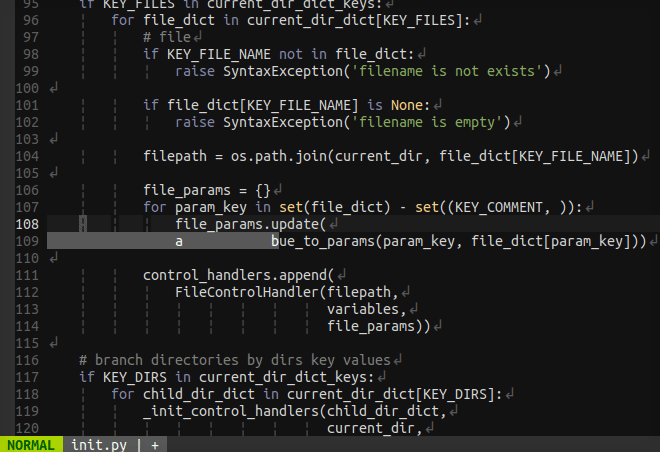pkm is the easy and customable key selection popup menu.
This sample program opens the popup menu that prints a color name. (The key 'x' closes the popup.)
let s:colors = ['red', 'blue', 'yellow', 'orange']
let s:options = #{
\ padding: [0, 1, 0, 1],
\ border: [1, 1, 1, 1],
\ filtermode: 'n',
\ }
let s:pkm_id = ''
function! SamplePkm()
if !pkm#Exists(s:pkm_id)
let s:pkm = pkm#PopupKeyMenu() " #1
let s:pkm.max_cols_lines = 2 " #2
let s:pkm.keys = 'rbyo'
let s:pkm.keys = 'rbyo'
function! s:pkm.OnKeySelect(winid, index) " #3
echo self.items[a:index]
endfunction
call s:pkm.Load(s:colors) " #4
endif
call s:pkm.Open(s:options) " #5
let s:pkm_id = s:pkm.pkm_id
endfunction
#1 The constructed pkm dict is managed by pkm.pkm_id in the
script variable dict ({ pkm_id : pkm_dict }). pkm#Exists() checks if
the pkm_id is exists in the script variable dict, and you can reuse the
pkm dict.
#2 pkm-props changes behaviors of the pkm popup. In this sample, '[key] item' pairs will be displayed in 2 columns, and '[key]' will be 'r', 'b', 'y', 'o'.
#3 pkm-handlers can be used by overriding. pkm.OnKeySelect() will be
called when the key is selected. In this case, the key 'r' returns 0, and the
key 'o' returns 3.
#4 The color names and the properties are loaded by pkm.Load(). Now the pkm
popup can be opened.
#5 pkm.Open() calls popup_create() and pass the options to that function.
let s:colors = ['red', 'blue', 'yellow', 'orange',
\ 'dark-red', 'dark-blue', 'dark-yellow', 'dark-orange',
\ 'light-red', 'light-blue', 'light-yellow', 'light-orange']
When you load a list that has items over pkm.key length, the items will be separated by pages.
On the default behavior, the 'l' key transits to the next page, and the 'h' key transits to the previous page.
Plug 'yuxki/vim-pkm-api'
Download and put the "autoload/pkm.vim" into your plugin directory, and rename interface functions with some commad like the following.
sed -i -e 's|pkm#|foo#pkm#|g' path/to/your/plugin/autoload/foo/pkm.vim
Please see the helps.
" open help
help pkm.txt
" table of contents
help pkm-api-contents
" APIs
help pkm-constructor
help pkm-methods
help pkm-handlers
help pkm-props
help pkm-utils
There are 2 samples. "Quick w" is the intallable plugin, and "Yank Clip" is the code only sample.
(Repo: https://github.com/yuxki/vim-quickw)
Postions the cursor at the word in the line quickly.
Clips and manages yanked text.
Yank and clip with <C-Y> in visual mode. And Run YankClipMenu to open the clip board.
:YankClipMenu
The Clip board displays the key that mapped text that clpped. When the text includes multiple lines, they are displayed like "first line ... last line".
The behavior of key selection is changed by the modes.
| Mode | Key | Key Selectiton Behavior |
|---|---|---|
| Paste | P | Paste selected text. |
| Register | R | Register text to be pastable. |
| Delete | D | Delete a clip. |
These keys operates the popup.
| Key | Description |
|---|---|
| C | Clear all clips. |
| x | Close the popup. |
A current mode is displayed at top left of the popup.
-> P:[P]Paste [R]Register [D]Delete [C]Clear [x]
Put the bellow script to ".vim/plugin" directory, and try this plugin.
let s:yank_clips = []
let s:clip_labels = []
func! s:YankAndClip()
let prev_register = @@
normal! gvy
if prev_register !=# @@
let sp_clip = split(@@, '\n')
call insert(s:yank_clips, @@)
if len(sp_clip) > 1
call insert(s:clip_labels, sp_clip[0] . ' ... ' . sp_clip[-1])
else
call insert(s:clip_labels, @@)
endif
endif
endfunc
xmap <silent> <C-Y> :call <SID>YankAndClip()<CR>
let s:option_labes = ':[P]Paste [R]Register [D]Delete [C]Clear [x]'
let s:clear_key = 'C'
let s:paste_key = 'P'
let s:register_key = 'R'
let s:del_key = 'D'
hi YankClipMenu term=reverse ctermbg=16 guibg=#000000
let s:pkm_id = ''
func! YankClipMenu()
" check instance is exists
if !pkm#Exists(s:pkm_id)
" construct
let s:pkm = pkm#PopupKeyMenu()
" set option
let s:pkm.alt = 'No clips'
" extend option
let s:pkm.mode = s:paste_key
" override handers
func! s:pkm.OnOpen(winid)
call setwinvar(a:winid, '&wincolor', 'YankClipMenu')
endfunc
func! s:pkm.OnFilter(winid, key) dict
if a:key == ':'
return -1
endif
" mode changes
if a:key ==# s:clear_key
let s:yank_clips = []
let s:clip_labels = []
call s:pkm.Load(s:clip_labels)
call s:pkm.Refresh()
return 1
elseif a:key ==# s:del_key
let self.mode = s:del_key
call popup_setoptions(a:winid, #{title:s:del_key . s:option_labes})
return 1
elseif a:key ==# s:paste_key
let self.mode = s:paste_key
call popup_setoptions(a:winid, #{title:s:paste_key . s:option_labes})
return 1
elseif a:key ==# s:register_key
let self.mode = s:register_key
call popup_setoptions(a:winid, #{title:s:register_key . s:option_labes})
return 1
endif
endfunc
" actions by current modes
func! s:pkm.OnKeySelect(winid, index) dict
if self.mode == s:del_key
call remove(s:yank_clips, a:index)
call remove(s:clip_labels, a:index)
call s:pkm.Load(s:clip_labels)
call s:pkm.Refresh()
elseif self.mode == s:paste_key
let save_prev_reg = @@
let @@ = s:yank_clips[a:index]
normal! p
let @@ = save_prev_reg
call popup_close(a:winid)
elseif self.mode == s:register_key
let @@ = s:yank_clips[a:index]
call popup_close(a:winid)
endif
endfunc
endif
let options = #{
\ filtermode: 'n',
\ title: s:paste_key . s:option_labes,
\ line: 'cursor+1',
\ col: 'cursor-1',
\ padding: [1, 1, 0, 1],
\ }
call s:pkm.Load(s:clip_labels).Open(options)
let s:pkm_id = s:pkm.pkm_id
endfunc
command! YankClipMenu :call YankClipMenu()



